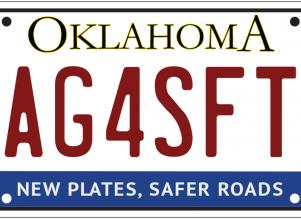David Koeneke: It's time to replace Oklahoma's shoddy old license plates
David Koeneke: It's time to replace Oklahoma's shoddy old license plates
By DAVID KOENEKE | Posted: Friday, March 18, 2016 12:00 am
“New license plates now!”
We don’t necessarily expect an angry mob to show up at the Capitol chanting that slogan. Still, maybe they should be. Having visible, undamaged plates affects everything from public safety to our ability to fund public schools.
Right now, our current license plates are over seven years old, almost three years past the recommended useful life. The reflective sheeting on many plates have deteriorated, making them difficult to see at night. Many of them are damaged from normal wear and tear. Here’s why that matters to Oklahoma, where unlike most states, vehicles only have a rear license plate:
Response to crime, alerts
Vehicles are used in more than 70 percent of all serious crimes. That means when police respond to a distress call, they usually are looking for a vehicle and a license plate as well as a person matching a physical description. Damaged plates or plates that are so old that they can’t be clearly seen at night — which represent a large portion of our plates in Oklahoma — can’t help in that search process. By allowing our plates to deteriorate we are handicapping law enforcement efforts in their everyday duties.
AMBER alerts for abducted children and Silver Alerts for seniors with cognitive disorders also rely on license plates. Again, responding to these alerts and helping these individuals-in-need requires an ability to clearly see and read a license plate.
Road safety
In addition to helping police identify vehicles, license plates serve as reflectors that increase visibility. Think of the times you barely avoided an abandoned vehicle on a rural road. New license plates help people avoid accidents and make our roads safer.
Oklahoma has one of the highest uninsured motorist rates in the nation, at 26 percent. These are the people who hit your car in the parking lot and then drive away because they are uninsured.
Even worse, they are the people who cause injury accidents and flee the scene. Ultimately, they contribute to dangerous situations and drive up insurance prices for responsible, law-abiding drivers.
At any given time, there are also more than 143,000 drivers who are unregistered. Most of us pay a registration fee every year — money that goes toward public schools and other essential government services. People who don’t register their vehicles are tax evaders and aren’t playing by the rules.
If the state issues new license plates, it helps to address both of these problems. To get a new plate, you need insurance and you need updated registration. After a license plate reissue, anyone driving around with an old plate has essentially hung a “pull me over” sign on the back of their car. One way or another, issuing new plates forces these people to play by the rules and be responsible drivers.
Besides issues of basic fairness, there are other reasons we need to reduce the number of Oklahomans who duck registration fees. At $62.50 a pop, drivers who fail to register are leaving the Motor Vehicle Fund approximately $9 million short of what it should be each year. That fund goes to public schools, county governments, road and bridge funding and law enforcement retirement needs.
Education funding, other needs
In case you haven’t heard, Oklahoma has a $1.3 billion budget shortfall and education, transportation and virtually every other core service of government is on the chopping block. Every penny counts, and I don’t want Oklahoma children to have even fewer resources in their classroom because some people won’t play by the rules.
What’s next?
I’ve laid out why I believe the state needs new license plates. So, how does it happen?
Surprisingly, this is not one of the many things in state government that involves navigating a complex web of regulations and rules to change. There is an easy fix with legislative authorization already on the books.
In 2008 the Oklahoma Legislature passed HB 3326, which allows the Department of Public Safety to call for a reissue any time after 2009.
My hope is that the agency takes advantage of its authority and delivers a new plate, in the name of safety, economic fairness and responsible and efficient government.
Dave Koeneke is director of the Oklahoma Safety Council.

